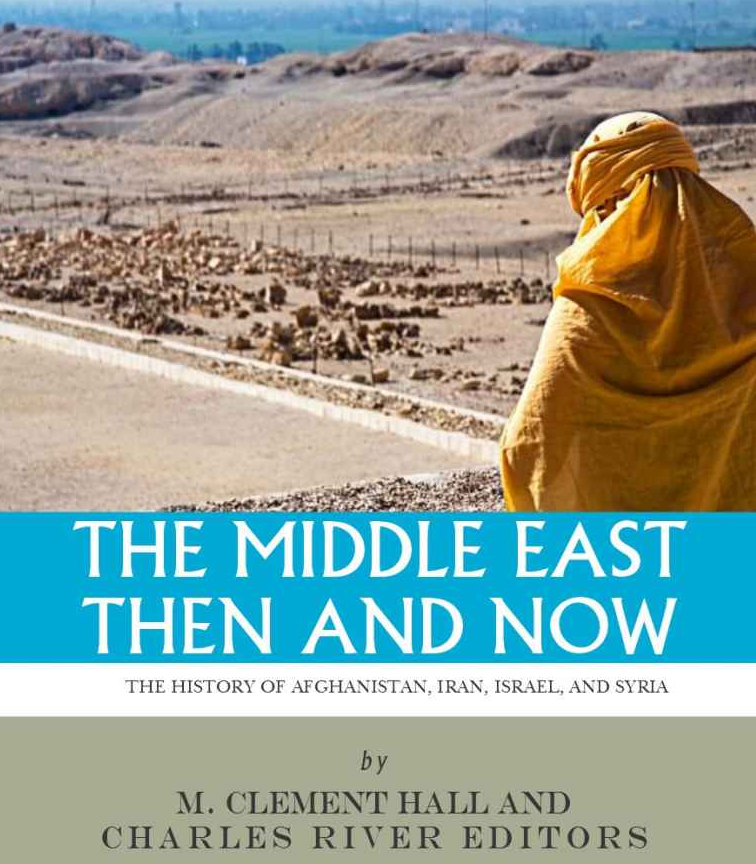Authors: M. Clement Hall and Charles River Editors
Paperback: 254 pages
Publisher: CreateSpace Independent Publishing Platform (October 26, 2013)
Language: English
ISBN-10: 1493591681
ISBN-13: 978-1493591688
Product Dimensions: 6 x 0.6 x 9 inches
Shipping Weight: 15.7 ounces

Before World War I, the West was largely unfamiliar with the Middle East, but in less than 100 years it has become the world’s hotspot, a turbulent and volatile tinder box full of sectarian, nationalist and cultural strife. In 2012, the Middle East is home to the Arab Spring, civil war in Syria, NATO operations in Afghanistan, the Israeli-Palestinian conflict, and Iran’s nuclear program, all of which continue to concern the rest of the world.
The Middle East Then and Now looks at all of today’s issues, as well as the history of four nations at the forefront of the conflict. In analyzing Israel’s past and present, this ebook breaks down all the terms often thrown around in the Middle East that make the peace process a political minefield, and one that both beginners and sophisticated followers have a hard time keeping up with. Serving as both a glossary and primer of the history of the Middle East conflict and the peace process, The Middle East Then and Now defines the terms, looks at the history, discusses previous attempts at negotiations like Oslo and Taba, identifies important figures, and explains the arguments and mentalities of each side, showing why the conflict has proven so intractable.
Although Iran was home of the Persian Empire and once had peaceful nuclear programs with Western cooperation before the Islamic revolution, today it is widely considered Israel’s archenemy and an antagonist of the West. This book traces Iran’s history from the Ancient Persian Empire to today.
As one of the hottest political topics in the world today, nearly everyone is aware of the ongoing violence in Syria, between forces loyal to the regime of Bashar al-Assad and opposition looking to overthrow the regime. Within that narrative are a number of sensitive issues, including sectarian strife between the majority Sunni population and the Alawites, not to mention Christians. People may know what’s going on in Syria today, but how did Syria get to where it is today, at the forefront of the Arab Spring? The history of Syria in the last century is one of turbulence, violence, and political intrigue, with local religious sects battling for control of the land while foreign powers vied to maintain influence over the region. What resulted was a toxic and twisted mess that has precipitously affected the entire region, from Israel and Lebanon to Iran and Iraq.
In the 21st century, as NATO’s operation against the Taliban and al-Qaeda has dragged on for over a decade, the old maxim that Afghanistan is the graveyard of empires has been revived. Indeed, the rugged, desolate, and mountainous region was a place that many Westerners likely could not have found on a map before the attacks of September 11, and now the nation’s border with Pakistan is one of the world’s hottest spots. Thanks to Afghanistan and the “Af-Pak” theater, people continue to learn about groups like the Haqqani Network, NATO’s struggles to subdue the Taliban and affiliated militants in Afghanistan are merely the latest chapter in Afghanistan’s very turbulent history. Well before the current conflict, Afghanistan frustrated the Soviet Union, and various tribes and religions have attempted to gain traction there over the last several centuries. The history of Afghanistan is a lesson in convolution.
Along with maps and pictures, The Middle East Then and Now looks at the region’s history and today’s issues, explaining how the Middle East became what it was today. With this comprehensive primer, get caught up on the state of affairs today.



